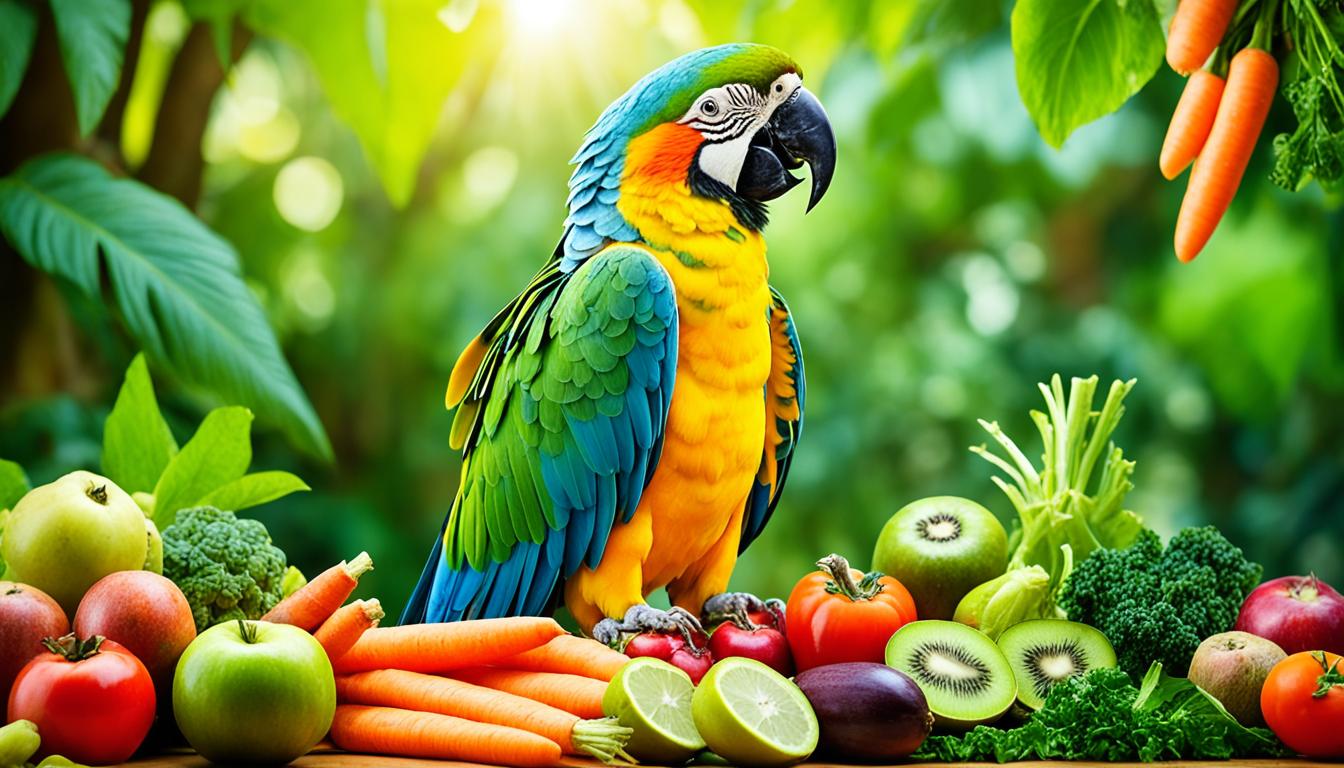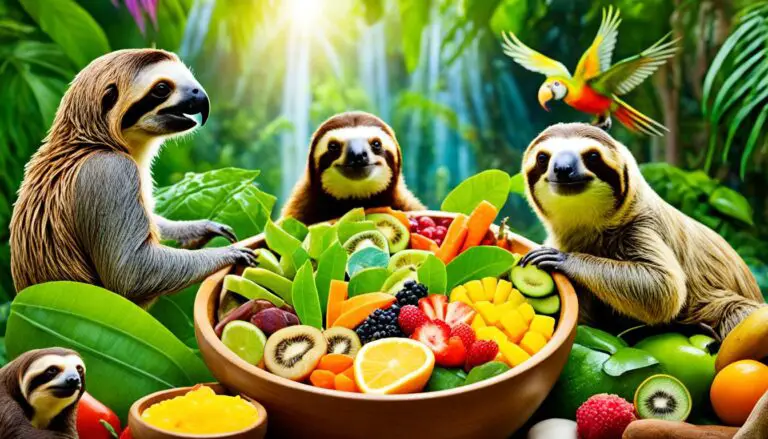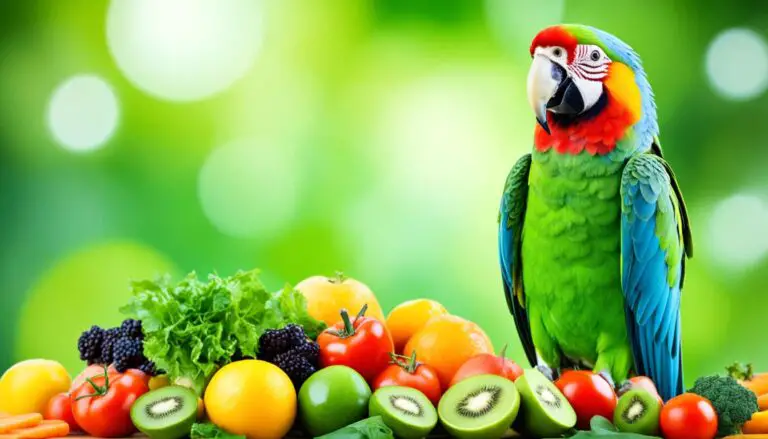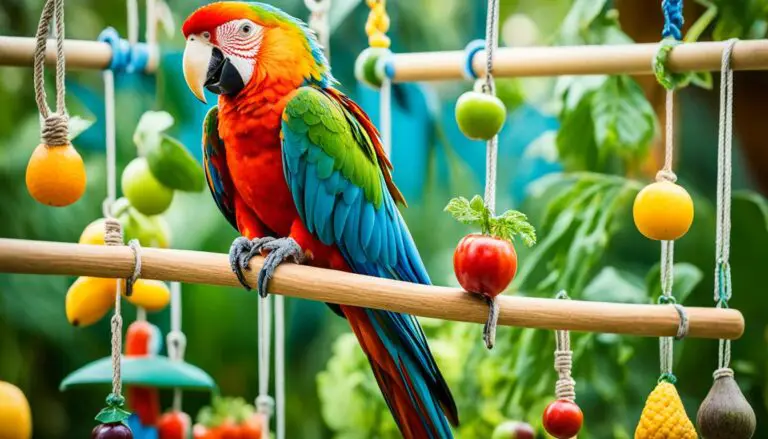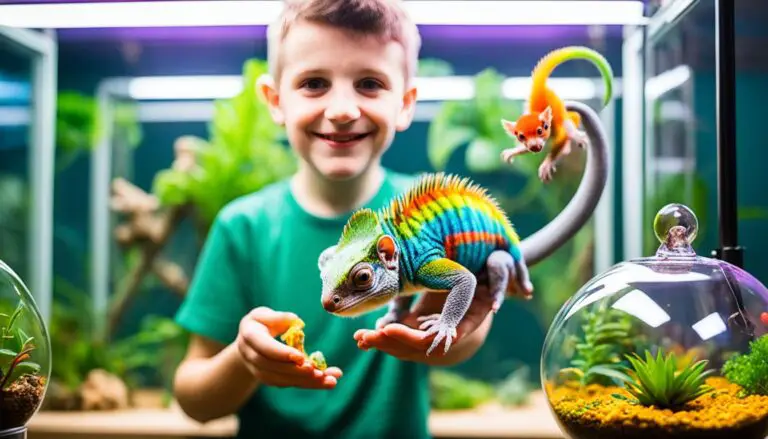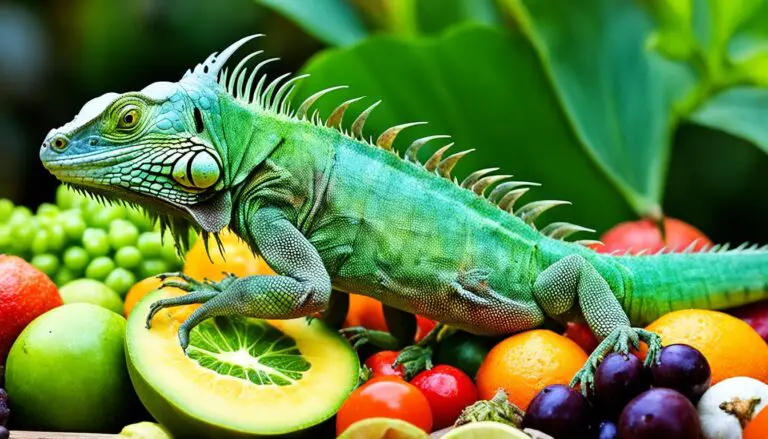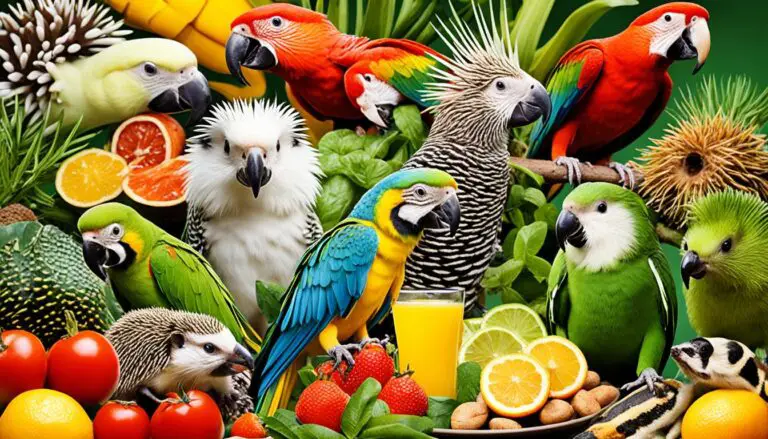Exotic Pet Diets: Nutritional Myths Debunked
Many people believe false ideas about what exotic pets should eat. Unfortunately, these wrong beliefs can cause pet owners to make mistakes. These mistakes often mean the pets do not get the right nutrition. In this article, we aim to clear up these myths and give you the facts. This way, you can make sure your pet gets what it needs to be healthy.
Key Takeaways:
- Understanding the truth behind common myths is crucial for providing a balanced diet to your exotic pet.
- Meat being the primary ingredient does not necessarily guarantee higher protein content.
- A high-protein diet may not always be better for exotic pets, as excessive protein can lead to health issues.
- The number of fruits and vegetables in pet food does not determine its nutritional value.
- Organic and all-natural pet foods may not be inherently healthier than other options.
Myth 1: Meat should be the primary ingredient in pet food.
Many pet owners think meat should be the top ingredient in pet food. This idea, though, is mostly wrong. The order on the label is by weight, not quality or amount of protein. So, the first ingredient might not be the main protein source.
Food makers can make meat seem more important by adding water or other things. This tricks you into thinking the food is meatier than it really is. So, the main ingredient isn’t always a good guide to how nutritious the food really is.
However, meat is still essential for pets. But focusing only on it might not give the full story on how good the food is. Always check the whole nutritional profile, not just the order of ingredients.
Understanding pet food labels
Pet food labels can be tricky. Knowing how to read them is important for picking the right food for your pet.
“The order in which ingredients are listed on pet food packaging is based on weight, not volume or quality.”
Here are some helpful tips:
- Look for complete and balanced nutrition: Ensure the pet food is labeled as “complete and balanced” for your pet’s particular life stage and species.
- Evaluate the guaranteed analysis: This shows the minimum protein, fat, fiber, and moisture content. It’s in the fine print on the package.
- Consider the quality of ingredients: Treating what’s in the food over the order on the label is wise. Choose foods with clear, specific animal protein like chicken or fish.
Meeting your exotic pet’s nutritional needs
Exotic pets have different needs depending on type, age, and health. It’s wise to talk to a vet that knows about exotic pet nutrition. They can help you with the right food that has the best balance of nutrients.
A balanced diet for exotic pets is more than just meat. Think about giving them various protein sources, from bugs to eggs to plant proteins. This variety helps ensure they get all the nutrients they need.
Myth 2: A high-protein diet is superior.
Many think a high-protein diet is always the best for exotic pets. But too much protein can cause obesity and digestive problems. It’s crucial to find the right balance.
The key is the quality of the protein, not just the amount. Some proteins are hard to digest or lack important nutrients. So, we should focus on the best protein sources for our pets.
For a good diet, offer a mix of protein sources. Lean meats, seafood, eggs, and some plant proteins work well for exotic pets. These foods are not only nutritious but also easy to digest.
Mixing various protein sources ensures our pets get all the vital nutrients. It supports their health and overall well-being. So, quality matters more than quantity in a protein-rich diet.

Myth 3: The more fruit and vegetable ingredients, the better.
People often think a lot of fruits and veggies in a pet’s food means it’s healthy. Mixing in these foods can help. But, not all fruits and veggies are equally good for your pet. It’s smart to look into each one to know what’s best for your exotic pet.
Adding many types of fruits and veggies gives pets important vitamins and minerals. Yet, be sure about what these items really add to the diet. Some might be more packed with nutrition. Others might not do much for your pet.
For instance, leafy greens like kale and spinach have vitamins A and K, plus calcium. But, fruits like berries give antioxidants and some sugar. You should limit how much sugar your pet eats.
Learning about your exotic pet’s specific nutrition needs is key. This helps you choose the right fruits and veggies and how much to give. Also, talking to a vet can help. They can give advice on what each exotic pet type needs.
| Fruit/Vegetable | Nutrients | Potential Benefits |
|---|---|---|
| Kale | Vitamins A and K, calcium | Promotes healthy vision, bone health |
| Spinach | Vitamins A and K, iron | Supports immune function, blood clotting |
| Berries | Antioxidants, natural sugars | Provides antioxidants, natural sweetness |
The table shows that each fruit and vegetable offers its own benefits. Knowing this helps exotic pet owners create special diets that fit their pet’s needs.
“While fruits and vegetables can provide valuable nutrients, it’s important to remember that they should complement a well-balanced diet that also includes appropriate sources of protein, fat, and other essential nutrients.” – Dr. Jane Thompson, Veterinarian
Realizing that more fruits and vegetables are not always better is important. This lets exotic pet owners make better nutrition choices. It’s essential to focus on a diet that gives all the needed nutrients for a healthy pet.
Myth 4: Organic and all-natural pet foods are healthier.
Lately, many pet owners are choosing “natural” and “organic” pet foods. They think these are better for their pets. But, it’s wise to look closer and see the truth behind these beliefs.
The words “natural” and “organic” often seem like a good choice. Yet, there’s no solid proof that these foods are richer in nutrition. The meanings of these words can change, and organic rules don’t always apply to pet foods. Keep in mind, marketing claims may not always be true.
It’s key to look at what the food contains and the source of the ingredients. Instead of just trusting labels like “natural” or “organic,” review what nutrients the food offers. Check if it matches the diet needs of your exotic pet.
Speaking with a vet who knows about exotic pet nutrition is a smart move. They can advise you on the best nutrients for your pet’s specific kind. They can also help you choose the right diet for your pet.
Always aim to give your exotic pet a diet that’s well-balanced and fits their needs. Put quality ingredients first. Also, seek expert advice before you change your pet’s diet in any big way.
Stay tuned for the next section where we will explore another common myth surrounding exotic pet diets.
Myth 5: Byproducts are waste.
Many people think byproducts in pet food are just waste. They believe these ingredients are low in quality. But this idea is wrong! Byproducts are good for your pet because they are full of nutrients they need.
Byproducts often mean animal parts like liver or tripe. These are parts of the animal that humans sometimes don’t eat. But they are full of vitamins and minerals that pets need for their health.
Using these parts of the animal in pet food is also good for the environment. It stops us from throwing away parts that are still very nutritious. This makes the process of making pet food better for the planet.
So, when you’re picking out pet food, think about what’s in it. It’s better to focus on the nutrients it offers than to avoid byproducts. Choose well-known brands that do good and use byproducts in a smart way. Asking your vet for advice is also smart. They can give you the best diet tips for your exotic pet.
Summary:
Byproducts in pet food are not waste; they can be a valuable source of nutrients and contribute to your pet’s overall nutrition. Consider the nutritional value of the ingredients and choose reputable brands that responsibly use byproducts.
Myth 6: Gluten and grains are bad for pets.
Misunderstanding often leads to the idea that pets should not eat gluten or grains. This thinking is not entirely true. Many pets do well with diets that include grains. Only some pets require gluten and grain-free meals.
Grains like corn, rice, and barley offer important nutrition and energy. They are rich in carbohydrates, fiber, and necessary vitamins. These are elements dogs and cats easily digest for their health.
Every pet’s unique needs should guide their diet, whether they can eat grains or not. A few pets might be allergic to certain grains or gluten. In such cases, a grain-free or gluten-free plan is suitable. Always check with your vet before changing your pet’s diet.

Focusing on what your pet individually needs is key, rather than myths. A healthy, varied diet is vital for your pet’s well-being. Ensure they get the right nutrients for a long and happy life.
Myth 7: Raw food diets are superior to kibble.
Many owners think giving their pets raw food is best because it’s like wild animals’ diets. Raw diets do have good points but also risks. They can carry harmful bacteria and might not have all the needed nutrients. It’s key to do your homework before changing to a raw diet.
Those in favor of raw diets say they make pets digest food better, have shinier coats, and be more energetic. However, not all pets do well on these diets. Every pet is different.
One big issue with raw diets is the risk of bacterial infection. Raw meat can have nasty germs like Salmonella and E. coli. These can make pets and people sick, leading to stomach problems or even worse infections.
Getting the right nutrients is hard with a raw diet. Pets need a mix of proteins, carbs, fats, vitamins, and minerals. Unless you’re really careful, your pet may not get everything it needs, which can cause health troubles.
Potential Risks of Raw Food Diets:
- Risk of bacterial contamination
- Difficulty in achieving a balanced diet
- Potential nutrient deficiencies
- Increased cost and preparation time
Talking to a vet is a must if you’re thinking about raw diets. They can check if your pet’s health, lifestyle, and needs fit a raw diet. Vets can give guidance on making a safe and balanced eating plan.
“While raw food diets may be appealing to some pet owners, it’s important to understand the potential risks and carefully consider the best diet for your pet’s overall health and well-being.”
The best diet for your exotic pet depends on many things like what type of animal it is, its age, health, and what it likes. The most important part is a balanced and complete diet. A vet can help make sure your pet gets the right food and clear up any confusion you might have about what to feed them.
Comparing Raw Food Diets and Kibble
| Raw Food Diets | Kibble |
|---|---|
| May promote healthier digestion | Convenient and easy to store |
| Potential risks of bacterial contamination | Longer shelf life |
| Requires careful planning and supplementation | Pre-formulated with balanced nutrients |
| Higher preparation time and cost | Less expensive and readily available |
Think about what’s good and bad in raw diets and kibble. Keep your pet’s unique needs in mind. Your vet is there to help with advice that’s just for your pet.
Myth 8: Cats can eat vegan diets.
Cats need meat in their diet because they are obligate carnivores. This means they must eat animal products. Trying to make cats eat a vegan or vegetarian diet can hurt them.
Cats can’t make essential nutrients like taurine and arachidonic acid from plants. They need these for their health. This includes having a healthy heart, good vision, and being able to reproduce.
Vegan or vegetarian food doesn’t have all the right amino acids and vitamins for cats. Cats must get enough of things like vitamin A, D, and some B vitamins. Without these, they can face many health problems.
Cats also need lots of high-quality animal protein. This is crucial for their muscle strength and overall well-being.
“Cats are obligate carnivores and have evolved to require a diet that consists primarily of meat. Feeding them a plant-based diet goes against their biological needs and can have serious health consequences. It’s essential to provide cats with the nutrients they need from animal sources to ensure their well-being.”
There are vegetarian cat foods available. However, these may not provide nutrients as well as real meat does.
It’s best to give cats a well-rounded diet. This should include high-quality commercial cat food. This way, you make sure they get all they need. If you’re worried about the environment, look for brands that care about it and animal welfare.
Anatomy and Physiology of Cats
Cats’ bodies are not made for plant food. They have a short gut and lack enzymes for plants. They need meat for their health.

It’s key to feed cats what’s best for them. This will keep them healthy and happy.
Myth 9: Feeding a snake more often promotes faster growth.
There is a mistaken idea in the exotic pet world. It suggests feeding snakes more often makes them grow faster. However, overfeeding your snake can hurt its health. Giving them big meals too often can stress their organs, make them overweight, and cut their life short.
It’s important to know the right way to feed snakes. They need careful watching, as each snake type, size, and age want different foods and feeding times. Talk to a vet who knows about exotic pets to get feeding advice. This will stop you from feeding your snake too much and help it stay healthy.
Snakes don’t eat as often as other animals because they’re ectothermic. This means their bodies work slower. To keep your snake healthy for a long time, feed it the right amount and not too frequently. This is better than making it grow fast.
Always put your snake’s health first when feeding it. Giving the right amount and types of food avoids many health problems. With a balanced diet and the vet’s help, your snake can live a happy and healthy life.
For more tips on what to feed your exotic pet and clearing up food myths, move on to the next part.
Debunking Exotic Pet Diet Myths: Section 10 Summary
This section looked into the myth about snakes needing more food to grow fast. But, this idea is wrong. Feeding snakes too much can damage their health. They could suffer from problems like stress on their organs, getting too heavy, and living a shorter life.
It’s better to feed snakes according to their true needs. Always aim for a balanced diet. This way, your snake can be healthy and fit for its species, size, and age. It’s crucial to think about your snake’s health and the food it really needs.
Stay with us for more about feeding exotic pets the right way. We’ll keep talking about what’s best for your special pets.
Myth 10: Reptiles that eat other animals can live on a vegan/vegetarian diet.
Many think reptiles that usually eat insects or rodents can do well on a vegan or vegetarian diet. But, this idea is incorrect. Reptiles need certain nutrients that their natural food provides.
These creatures have diets that depend on their environment to keep their bodies working. They must eat food that gives them proteins, calcium, vitamins, and minerals to stay healthy.

A vegan or vegetarian diet usually doesn’t have what a reptile needs. They might not get the right amino acids, vitamins, and minerals from such foods. This can lead to malnutrition and other serious health problems.
It’s vital to feed reptiles things that are similar to what they would eat in the wild. This includes insects, rodents, or other prey. These foods offer the right nutritional balance for your pet’s species. If you’re not sure how to feed your reptile, ask a vet or a reptile expert for help.
To summarize:
- Reptiles that primarily eat other animals cannot live on a vegan or vegetarian diet.
- They must eat their natural prey for certain nutrients.
- Vegan or vegetarian diets may not have the necessary amino acids, vitamins, and minerals.
- It’s crucial to give reptiles a diet that mirrors their natural food for their well-being.
It’s key to make sure your exotic pet gets the right nutrition. A diet tailored to their needs is essential for a long, healthy life.
Conclusion
It’s vital to feed exotic pets properly for their health. This means we need to clear up myths about their diets. Knowing the truth helps exotic pet owners give their pets the right kind of food.
Talking to a vet is an important step. They can tell us exactly what our exotic pets need to eat. They give great advice and can adjust the diet to fit each type of pet.
Doing your homework is key to feeding exotic pets well. Keep up with new diet trends to make good choices. This keeps our pets healthy and happy.
By understanding true needs and ignoring fads, you can feed your exotic pets right. Follow the best advice to make sure they get the nutrition they need.
FAQ
What is one common myth about exotic pet diets?
Is a high-protein diet better for exotic pets?
Are more fruit and vegetable ingredients always better for exotic pets?
Are organic and all-natural pet foods healthier?
Are byproducts in pet food waste or low-quality ingredients?
Are gluten and grains bad for pets?
Are raw food diets superior to kibble?
Can cats eat vegan diets?
Does feeding a snake more often promote faster growth?
Can reptiles that eat other animals live on a vegan/vegetarian diet?
Source Links
- https://northeastanimalhospital.com/news/grain-free-and-exotic-ingredient-pet-food-diets
- https://www.dvm360.com/view/fact-or-fiction-debunking-common-pet-food-myths
- https://reptilesupply.com/blogs/reptiles/14-more-reptile-care-myths
Peter Stones is the founder of Exotic Pets Place, the leading online resource for exotic pet care information.
With over 10 years of hands-on exotic pet ownership experience, he is deeply passionate about sharing his expertise to help others properly care for their unusual pets.
When he's not writing extensively researched articles or connecting with fellow exotic pet enthusiasts worldwide, you can find Peter at home tending to his own beloved menagerie of exotic animals.

